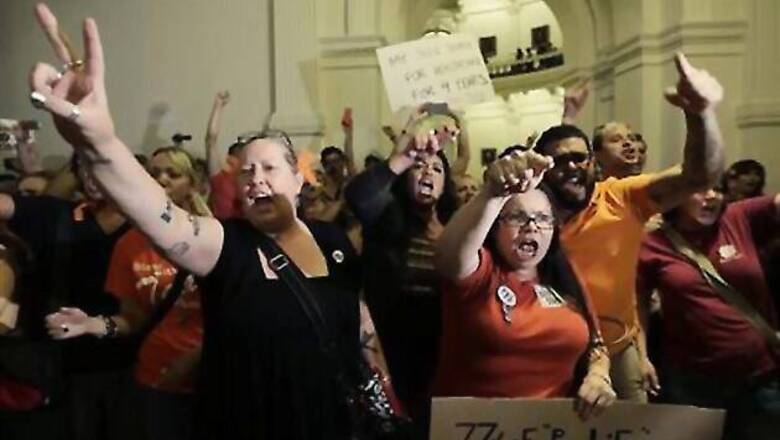
views
A proposal that would make Texas one of the nation's toughest places to get an abortion won swift approval on Wednesday in the state House, sending it on to the Senate where a filibuster and raucous protests derailed Republican efforts to pass it nearly two weeks earlier.
There is little Democrats can do to stop the measure this time in the GOP-controlled Legislature, but they're seeking to create a legislative record that opponents can use to challenge it in federal court on constitutional grounds. Democrats also hope to use women's health issues to win more seats in 2014.
It was the third time the House had passed the limits on where, when and how women can obtain the procedure. Gov. Rick Perry called lawmakers back into a second special session after the bill failed to reach the full Senate during the regular session and a filibuster there kept it from becoming law in the first special session.
All but one Republican voted for the bill, along with four Catholic Democrats. Protesters both for and against the measure have marched on the Capitol, filling marathon committee meetings and floor debates. Opponents wore orange, while supporters wore blue, and national activists from both sides of the abortion debate staged rallies on the statehouse steps.
"The tremendous outpouring of support for this legislation has demonstrated how Texas stands for life, and I commend everyone who wore blue, turned out and spoke up in support of life in our state," Perry said in a statement on Wednesday. "Now is not the time to waver, however, as the Senate continues its important work in support of women's health and protecting the lives of our most vulnerable Texans."
The Senate could cast a final vote as early as Friday.
Lawmakers spent more than 10 hours debating the measure on Tuesday, and Republicans rejected every attempt to amend the bill. Hundreds of protesters in the Capitol rotunda after the vote chanted, "Shame on you!"
The bill requires doctors to have admitting privileges at nearby hospitals, only allow abortions in surgical centers and ban abortions after 20 weeks.
Rep. Ruth McClendon, D-San Antonio, made one last attempt to amend the bill on Wednesday to add funding for the Adoption Assistance Program, which provides financial assistance to families that adopt children in the foster care system. Other Democrats said that if the bill passes, the number of unintended pregnancies would increase and place greater demand on the foster system.
"If we don't adopt this amendment, then we are saying that we don't care about the children of Texas," she said.
But the bill's author Rep. Jody Laubenberg, R-Parker, said she opposed all amendments to her bill. She said the Legislature had appropriated enough money for foster children.
"I am proud of the step we've taken to protect both babies and women. I think it speaks volumes about who we are as humanity," Laubenberg said.
Planned Parenthood took their Stand With Texas Women campaign on the road on Tuesday, rallying more than 1,100 supporters in downtown Houston to oppose the measure. The bus tour was expected in Dallas on Wednesday, with a speech by Fort Worth Sen. Wendy Davis, a rising Democratic star following her filibuster against the bill in the first special session last month.
No other issue in Texas has rallied Democratic voters, young activists and women's right supporters in recent years like the abortion measure. The Texas Democratic Party has helped organize rallies opposing the bill and used them to register new voters.
Perry has made it a personal goal to end abortions in Texas, and voting for anti-abortion measures is a litmus test for Republican politicians. Conservative Christian groups keep scorecards on lawmaker's voting records.
They also say the Texas restrictions and those passed by other states conflict with the US Supreme Court's 1973 Roe v. Wade decision, which established that a woman has the right to get an abortion until her fetus could viably survive outside of the womb, which is generally at 22 to 24 weeks of the pregnancy.
It's unclear if the Texas restrictions could survive a court challenge. Federal courts have suspended aspects of the bill enacted by other states. On Monday, a federal judge blocked enforcement of a Wisconsin abortion law requiring admitting privileges.
The Texas Medical Association, the Texas Hospital Association and the American College of Obstetrics and Gynecology oppose the bill, calling it unnecessary.
















Comments
0 comment